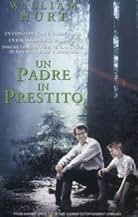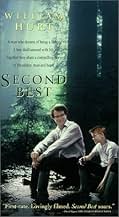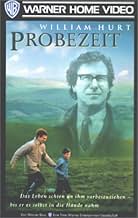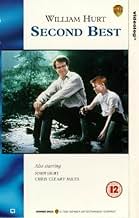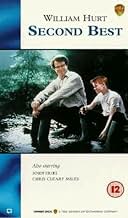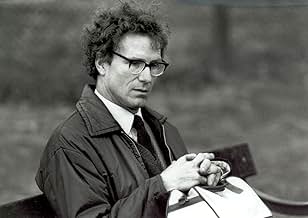Graham, a lonely Welsh postal worker, adopts James, a troubled ten-year-old boy. Graham always wanted a son, but James loves his biological father too much to give Graham a chance. Will the ... Read allGraham, a lonely Welsh postal worker, adopts James, a troubled ten-year-old boy. Graham always wanted a son, but James loves his biological father too much to give Graham a chance. Will the two be able to accept each other as family?Graham, a lonely Welsh postal worker, adopts James, a troubled ten-year-old boy. Graham always wanted a son, but James loves his biological father too much to give Graham a chance. Will the two be able to accept each other as family?
- Awards
- 1 win & 2 nominations total
Featured reviews
I rarely write reviews for movies. And having seen the other excellent reviews, mine is hardly needed. But I stumbled across this movie and felt I had to comment on it.
This is an excellent movie with wonderful acting, directing, writing, screen play, and filming. I saw the last 2/3 of the movie by accident and could not tear myself away from it.
William Hurt and the boy actor (sorry - forgot the name) are thrown together by life's accidents and develop bonds for one another. The rough edges on each character are worn smooth as each accommodates the other and learns of the other's trials and humanity. The acting is superb and rarely gets in the way of the content - more to the point, the acting complements the story well.
But what makes the movie special is the character development. The writing, directing, and screen play successfully convey the existential experiences of the actors as they develop and react to one another.
A good song, a good poem, a good book - are made special if they are accessible - if they evoke within you the ring of truth and personal history. This movie communicated with me extremely well on a personal basis, on many plans at the same time. Every element of this film was well crafted. The movie is cerebral and touching - with very few rough edges. I couldn't recommend it more highly for an adult audience.
This is an excellent movie with wonderful acting, directing, writing, screen play, and filming. I saw the last 2/3 of the movie by accident and could not tear myself away from it.
William Hurt and the boy actor (sorry - forgot the name) are thrown together by life's accidents and develop bonds for one another. The rough edges on each character are worn smooth as each accommodates the other and learns of the other's trials and humanity. The acting is superb and rarely gets in the way of the content - more to the point, the acting complements the story well.
But what makes the movie special is the character development. The writing, directing, and screen play successfully convey the existential experiences of the actors as they develop and react to one another.
A good song, a good poem, a good book - are made special if they are accessible - if they evoke within you the ring of truth and personal history. This movie communicated with me extremely well on a personal basis, on many plans at the same time. Every element of this film was well crafted. The movie is cerebral and touching - with very few rough edges. I couldn't recommend it more highly for an adult audience.
William Hurt is an interesting actor. Although he has made many money making Hollywood films, he seems to enjoy also making small artistic films that MUST bring him a lot less money but perhaps more personal satisfaction. Among these many "little" films he has done is Second Best--an odd little film well worth watching. Is it a perfect film? Certainly not. At times, it is a bit slow and emotionally sterile--though this is needed due to the type man Hurt is portraying. For some inexplicable reason (it would have been nice to know more about WHY), Welshman Hurt decides to take in a hard to adopt boy with the intention of adopting him. Because the boy has lots of emotional baggage, they do not easily bond and their relationship is strained. However, just because there are these awkward moments, do not stop watching--the payoff is there and the characters are much more realistic (with all their foibles) than what you are usually given in a typical movie!
David Cook, author of the novel of the same title and also involved in the film, is known for his sensitive and probing treatments of characters marginalized in society. After seeing the film, I made a point of searching for the book, and at long last spotted a "galley proof edition" in a used bookstore in Oxford. The picture is faithful to the novel-- if anything, excessively so. Much dialogue is reproduced intact. A number of small incidents and gestures which seem inconsequential or puzzling in the movie were revealed as symbols or evocations of episodes which the book had fleshed out. Directors themselves so immersed in every detail are at risk of assuming too much understanding from the audience, depriving them of just another few words, or a brief camera close-up, which would have put a point across coherently. But these are quibbles, for there is enough depth and quiet eloquence left here to call for a rare ten stars out of ten.
This is the story of an unlikely relationship which succeeds as the mutual balm for unusual wounds. The man Graham and the boy Jamie both suffer profoundly from separation from their fathers-- physical separation in Jamie's case (his adored dad is in prison), emotional in Graham's. Each discovers that the other cherishes the memory of just a few days of filial closeness, shattered shards of supreme bliss sparkling in the dismal landscape of their emotional lives. Yet not only does Graham, a candidate to adopt Jamie, lack the primary qualification for a stepfather: a wife. He is a shy nerd with no obvious charisma whatsoever for a hyperactive, street-wise, cynical kid.
But traumas in his past have stamped this boy with a vehement misogyny. As little as he fancies anyone presuming to take his father's place, he craves having a stepmother even less. Graham's bachelorhood is a relative advantage. Graham proves himself gradually with humility, honesty, and a quality of unfailing respect for the person struggling underneath Jamie's sullenness which one can only describe as reverence. A "special-ed" teacher of my acquaintance called Jamie (and Chris Cleary Miles' passionate characterization) very realistic, and pronounced Graham (as brought to life masterfully by William Hurt) "a genius" in his approach to the developing relationship.
While some will complain that this film drags, others will value its quiet atmosphere in which heart-codes are patiently decrypted. The more important the dialogue is, the likelier it is to approach whispers. One crucial central scene, barely audible, as the haunting strains of the score's "rift" theme echo away more faintly still, never to be heard again, must be one of the tenderest moments ever captured on celluloid.
Perhaps Graham has been plagued by a touch of agoraphobia. The cinematography deftly suggests this world view: interiors of small rooms, fussy wallpaper, obtrusive props, brilliant curtains covering the windows; exteriors somehow painting scenes of ravishing beauty with brushstrokes of vague terror.
Graham Holt is an unlikely hero, but a true one. If more people treated one another the way he does, the world would be a better place.
This is the story of an unlikely relationship which succeeds as the mutual balm for unusual wounds. The man Graham and the boy Jamie both suffer profoundly from separation from their fathers-- physical separation in Jamie's case (his adored dad is in prison), emotional in Graham's. Each discovers that the other cherishes the memory of just a few days of filial closeness, shattered shards of supreme bliss sparkling in the dismal landscape of their emotional lives. Yet not only does Graham, a candidate to adopt Jamie, lack the primary qualification for a stepfather: a wife. He is a shy nerd with no obvious charisma whatsoever for a hyperactive, street-wise, cynical kid.
But traumas in his past have stamped this boy with a vehement misogyny. As little as he fancies anyone presuming to take his father's place, he craves having a stepmother even less. Graham's bachelorhood is a relative advantage. Graham proves himself gradually with humility, honesty, and a quality of unfailing respect for the person struggling underneath Jamie's sullenness which one can only describe as reverence. A "special-ed" teacher of my acquaintance called Jamie (and Chris Cleary Miles' passionate characterization) very realistic, and pronounced Graham (as brought to life masterfully by William Hurt) "a genius" in his approach to the developing relationship.
While some will complain that this film drags, others will value its quiet atmosphere in which heart-codes are patiently decrypted. The more important the dialogue is, the likelier it is to approach whispers. One crucial central scene, barely audible, as the haunting strains of the score's "rift" theme echo away more faintly still, never to be heard again, must be one of the tenderest moments ever captured on celluloid.
Perhaps Graham has been plagued by a touch of agoraphobia. The cinematography deftly suggests this world view: interiors of small rooms, fussy wallpaper, obtrusive props, brilliant curtains covering the windows; exteriors somehow painting scenes of ravishing beauty with brushstrokes of vague terror.
Graham Holt is an unlikely hero, but a true one. If more people treated one another the way he does, the world would be a better place.
I've read the other reviews posted here and concur with all of them. The film triumphs in its realistic depiction of two broken hearts, Jamie's and Graham's. I think, in order to appreciate the story, one must have somehow experienced the psychic shock of childhood abandonment, either emotionally or by outright physical abandonment. The pleasure of watching this film, aside from the acting and cinematography, is having the sense that it will work out okay. At the very end, when Jamie walks briskly to catch up with Graham, slips his hand into the grownup's hand, and then walks much more slowly, one can see in their stride together the fulfillment each has received. I rewound the film at that point to see that scene again.
This is a moving, touching film. For me a little bit frightening too. In the real world there are some people, who behave like Holt. (Unimportant, but funny that the word "Holt" means Dead in Hungarian which is my first language.) This movie is like a therapy, an advice for unhappy, lonely people. A believable film is a great pleasure nowadays, but if you meet your own life face-to-face in a script, well... it's pretty scary. If you pay attention good enough, it changes your life! Thank God for this film!
Did you know
- TriviaSeveral reviews claimed that this film is set in Wales, and a Welsh town was the chief location for the movie, but the setting is, in fact, never specified and the accents of the actors in the film cover a wide area across Britain. Although the American William Hurt was praised for learning a Welsh accent, he actually sounds more like an Englishman from the West Country. It is noticeable that all the road signs seen in the film are only in English, whereas road signs in Wales are always in both English and Welsh.
- ConnectionsFeatured in Siskel & Ebert & the Movies: Only You/Second Best/Pulp Fiction (1994)
- How long is Second Best?Powered by Alexa
Details
Box office
- Gross US & Canada
- $86,115
- Opening weekend US & Canada
- $19,190
- Oct 2, 1994
- Gross worldwide
- $86,115
- Runtime1 hour 45 minutes
- Color
- Sound mix
- Aspect ratio
- 1.85 : 1
Contribute to this page
Suggest an edit or add missing content




